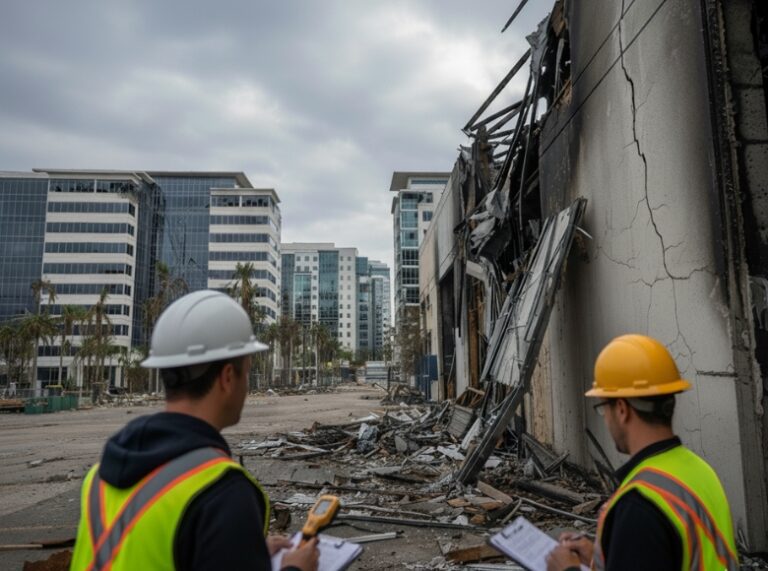Filing large commercial property claims often creates a stressful environment for businesses already recovering from loss. In this process, an insurance appraiser plays a central role in estimating damages and assigning a value to the claim. Yet, the way these appraisers operate can significantly impact the settlement outcome. Insurance companies hire them with one clear motive: to protect their own financial interests. This means that appraisers look for ways to provide lower estimates to save the insurance company money.
For policyholders facing large losses, this approach can reduce their rightful compensation and prolong the entire claim settlement process. Understanding how insurance appraisers work, the tactics they use, and the role of public adjusters in balancing the scale is critical to achieving fair outcomes in commercial property claims.
Why the Insurance Appraiser Matters in Large Claims
An insurance appraiser acts as the insurance company’s representative during the evaluation of damages. Their assessments carry weight because insurers rely on them to calculate how much to pay out. The problem for property owners lies in the conflict of interest. While the policyholder seeks to recover the full value of the damages, the insurance appraiser focuses on minimizing costs for the insurer. This dynamic often leads to undervalued claims that leave businesses without the resources they need for full recovery.
When disaster strikes a commercial property, damages are rarely straightforward. Repairs often include hidden structural issues, expensive machinery, or complex building systems. If the insurance appraiser fails to include these factors, the estimate drops significantly. By controlling these figures, insurers reduce their payout responsibilities, but businesses carry the financial burden.
Tactics Insurance Appraisers Use to Limit Payouts
Insurance appraisers often use strategies that result in lower valuations. Some of the common tactics include:
- Selective Documentation – Appraisers may highlight minor damages while ignoring more significant issues that demand higher repair costs.
- Depreciation Overestimation – Many appraisers apply aggressive depreciation rates to reduce the value of items, even if those assets remain fully functional.
- Narrow Scope Assessments – Appraisers sometimes limit their inspections to visible damage, leaving out hidden damages that only appear with detailed evaluation.
- Delays in Reporting – By prolonging the process, appraisers create financial strain on the business, pressuring owners to accept lower settlements.
These tactics make claim settlements challenging for policyholders who lack the expertise to dispute the findings. A public adjuster has the knowledge to intervene and bring balance to the process.
The Difference Between an Insurance Appraiser and a Public Adjuster
While the insurance appraiser protects the insurer, a public adjuster works entirely for the policyholder. The two roles stand in opposition, and their involvement often decides the outcome of large property claims.
A public adjuster examines every detail of the damages, reviews policy language, and challenges the insurance appraiser’s findings. By leveraging expertise, a public adjuster ensures that estimates include hidden damages, accurate depreciation, and fair valuations. This advocacy allows businesses to pursue claim settlements that reflect their actual losses.
Unlike the insurance company’s appraiser, a public adjuster has no incentive to lower the estimate. Their sole responsibility lies in achieving fairness for the policyholder. When both sides present their evaluations, the process becomes a negotiation rather than a one-sided assessment.
Key Responsibilities in Property Damage Claims
Large property claims demand close attention to detail. Both the insurance claims adjuster and the public adjuster play critical roles, but their objectives diverge. An insurance appraiser may function as part of the wider team of claims adjuster responsibilities within the insurer’s process, but the property owner’s defense lies with the public adjuster.
A property claims adjuster who represents the business provides comprehensive evaluations that include every layer of damage. This includes not only visible structural issues but also internal systems, inventory, and high-value equipment. Independent assessments, when handled properly, challenge the limited scope that an independent claims adjuster from the insurer might present.
By understanding these differences, policyholders can protect themselves from undervalued claims and ensure the settlement reflects the real cost of recovery.
How Insurance Appraisers Impact Claim Settlements
Claim settlements in large commercial cases often span millions of dollars. An insurance appraiser’s role in this process can either secure a fair resolution or drastically reduce the funds available to rebuild. Every line item on their report directly influences the final payout.
For example, undervaluing specialized machinery by even 10% can create hundreds of thousands of dollars in losses for the business. Applying excessive depreciation across an entire facility compounds these losses even further. When insurers lean heavily on these appraisals, policyholders find themselves in prolonged disputes.
The presence of a skilled public adjuster prevents these findings from going unchallenged. They provide alternative valuations and evidence, forcing insurers to reevaluate lowball estimates. The result often leads to higher settlements and quicker resolutions.
Why Early Public Adjuster Involvement Levels the Field
When businesses involve a public adjuster early in the process, they gain an advocate who can respond immediately to the insurance appraiser’s report. Early involvement means the public adjuster documents damages thoroughly, counters undervaluation, and protects the claim before it spirals into disputes.
Without this support, insurers can use the insurance appraiser’s report as the foundation of negotiations, placing the policyholder at a disadvantage from the start. By contrast, early intervention creates leverage and ensures that the insurance company cannot rely solely on its internal assessment.
Searching for a public adjuster at the onset of a claim can prove to be one of the most strategic steps a business takes in recovering from a large commercial loss.
Conclusion: The Role of Insurance Appraisers in Large Claims
Insurance appraisers shape the outcome of large commercial property claims. Their responsibility to the insurance company often results in undervalued assessments, aggressive depreciation, and limited scope reporting. These tactics directly reduce claim settlements and shift the financial burden onto the policyholder.
Public adjusters stand as the counterbalance in this process. By challenging an insurance appraiser’s findings and advocating for comprehensive valuations, they help businesses achieve fair outcomes. In large commercial claims where millions are at stake, ignoring this dynamic can result in devastating financial consequences.
Continental Adjusters: Supporting Policyholders in Complex Claims
Continental Adjusters provides specialized support for large commercial property claims where insurance appraisers undervalue damages. With decades of experience, a team of expert adjusters evaluates claims thoroughly, identifies overlooked damages, and negotiates fair settlements. This approach ensures policyholders receive compensation that reflects the full scope of their losses, not just the minimized figures presented by the insurer’s representatives.
By focusing on accurate assessments and strategic negotiation, Continental Adjusters helps businesses recover faster and more effectively after major property losses.
Contact Continental Adjusters today to secure experienced guidance in complex commercial property claims and protect your rightful settlement.
FAQs
Q. What does an insurance appraiser do in commercial property claims?
An insurance appraiser evaluates the extent of damages and assigns a monetary value for the insurance company. Their report often becomes the foundation for how much the insurer decides to pay in claim settlements.
Q. Can an insurance appraiser’s valuation be challenged?
Yes, the valuation provided by an insurance appraiser can be disputed if it appears incomplete or undervalued. Public adjusters and independent experts present alternative evidence to secure fair compensation for the policyholder.
Q. How do public adjusters help with undervalued claims?
Public adjusters carefully document damages, review policy language, and provide counter-estimates that challenge low valuations. Their involvement often increases settlement amounts and speeds up the claims process.
Q. When should a business hire a public adjuster?
A business should hire a public adjuster as soon as a large commercial property loss occurs. Early involvement ensures that damages are fully documented and that the insurer cannot rely solely on the insurance appraiser’s limited report.



